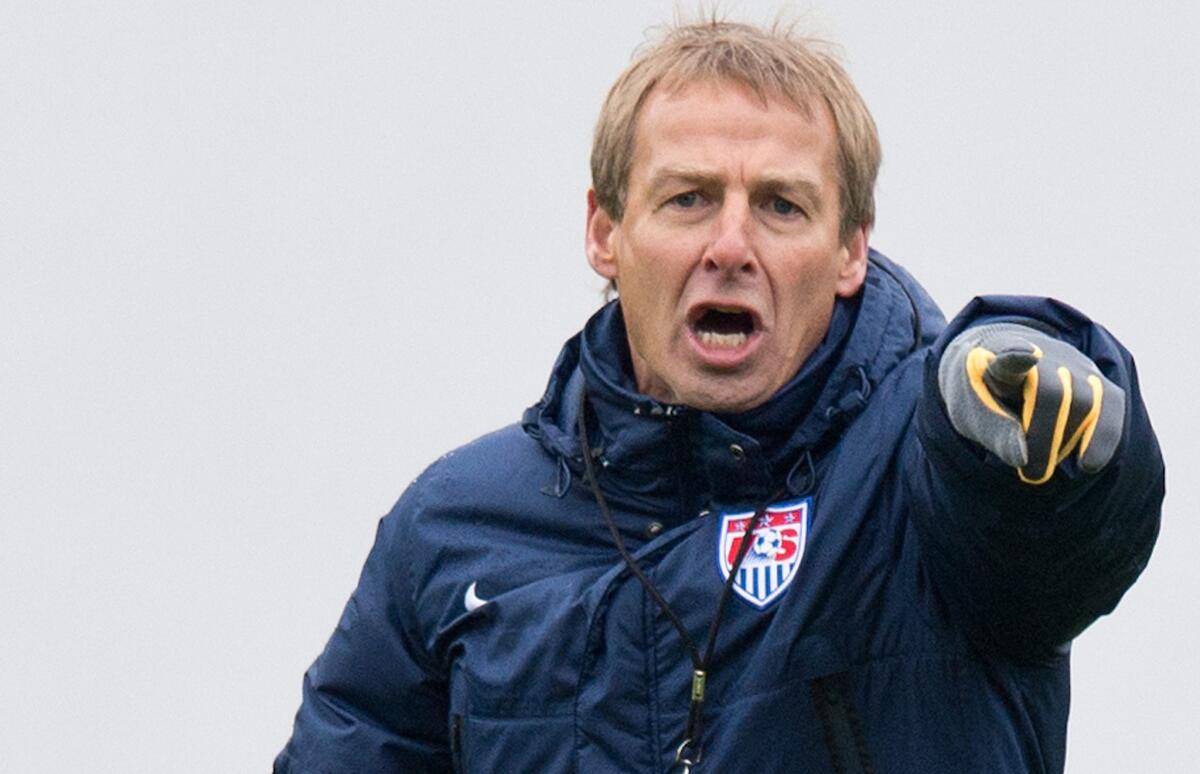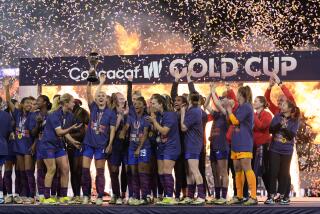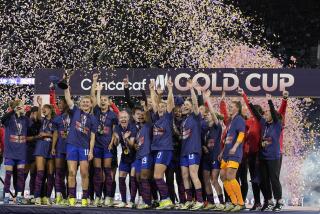U.S. Coach Juergen Klinsmann is ready for World Cup to begin

The U.S. won’t play its first game in this summer’s World Cup for seven weeks. But, predictably, Juergen Klinsmann is already impatient.
“It is an exciting time,” the U.S. national soccer team coach said over breakfast. “It finally gets down to what really matters. The tournament itself.”
That also means there is still much to do and precious little time left to do it.
So when Klinsmann speaks the words rush out, with adverbs tumbling into the wrong places and sentences forming without pronouns. Part of that is because Klinsmann thinks in his native German but often speaks in one of four other languages.
Then again, skip a pronoun here or there over the course of the day and who knows how much time you’ll save. And now, as the World Cup nears, time is of the essence.
“The clock ticks,” Klinsmann said. “We’re getting closer so you zoom in. You monitor all the guys that you have out there. You talk to the coaches, you talk to the people who go to the games.
“I think we are very well prepared now. Still have to work on a couple of ends.”
The first is selecting a preliminary World Cup roster of the 30 players who will be invited to the U.S. training camp at Stanford next month. That roster will be trimmed further in early June, to the 23 who will represent the U.S. in Brazil.
There, Klinsmann’s squad will face the toughest test an American team has endured in a World Cup. Not only is the field the deepest in tournament history, but the U.S. was drawn into a four-nation group for opening-round play that includes Germany and Portugal, two of the top three teams in the world according to FIFA rankings, plus Ghana, which eliminated the U.S. in the last two World Cup tournaments.
The U.S. will travel nearly 9,000 miles in the 11-day group stage, more than any other team, and the climates will range from the humidity of the Amazon to the tropical rains of the Atlantic coast.
Klinsmann, predictably, is looking forward to the challenge.
“You need timelines. And deadlines are always a good thing,” he said earlier this year. “You see the light at the end of the tunnel. We know now a bit better what Brazil is about.
“I think it’s just more excitement growing.”
Juergen Klinsmann was 8 the first time he played organized soccer. And the sport was still so baffling to him, when he left the bench to play in the final 10 minutes of that first game, he paused in front of the coach and asked him to explain, one last time, what “offside” meant.
After six months and countless hours spent kicking a ball against a garage door, the boy, no longer a novice, scored 16 goals in a 40-minute game.
The anecdote speaks volumes about Klinsmann’s approach to the game that has become his livelihood. Even at a young age he understood the sport was as cerebral as it was physical and was one that would reward practice and repetition as much as it would size and speed.
After 40 years, that approach hasn’t changed. Klinsmann, one of the best strikers ever, won a World Cup as a player, took Germany to a third-place finish in the World Cup as a coach and last year guided the U.S. national team to 16 victories and a .761 winning percentage, both the best marks in its history.
Yet, if any of that has given him reason to pause, it has been a very short pause. The son of a baker, Klinsmann worked long, hot hours alongside his father to help out in the family’s business. And his work ethic hasn’t ebbed.
“When you see your father work 14-, 16-hour shifts a day, you develop that sense of ‘you’ve got to just work for what you want to achieve.’ Our region, where we are from, that’s just in the DNA,” said Klinsmann, who was born and raised near Stuttgart. “For me it was just normal to be doing two things, three things. Going to school, working and training.
“It was fulfilling to me. It’s just the way I knew it.”
Klinsmann, at 49 still energetic, boyish-looking and just a few ounces over his playing weight, is still working overtime. One of his favorite phrases is “24/7,” which he uses to describe his workday — and the one he expects from his players. In his world, every decision a player makes, from what he eats and drinks to the friends he keeps, should take into account how it might affect his game.
At times Klinsmann comes off as a New Age guru, passionately preaching the benefits of diet and the evil of soft drinks. He also likes to keep his players uncomfortable and on edge, guessing as to what their role might be in the hope of getting them to work harder. That’s one reason why Landon Donovan, the leading scorer in U.S. history, was banished to the “B” team after his three-month sabbatical last year.
And for a while much of that rubbed players the wrong way. Fourteen months ago, after the U.S. opened World Cup qualifying with a loss in Honduras, the Sporting News reported a player rebellion was brewing.
But when the U.S. won its next game, and lost only once in the next six months, it was hard to disagree with Klinsmann’s methods. Even Donovan came around, briefly winning back the coach’s trust with seven goals in six games last summer.
“There was a time period needed to buy into what Juergen was trying to relate to players,” said Sunil Gulati, president of U.S. Soccer and the man who hired Klinsmann and recently signed him to a contract extension that will keep Klinsmann in charge of the national team program through 2018. “You’re never in a situation where everybody’s happy or everybody’s mad. You have to believe in yourself and you have to convince others to follow.”
The Klinsmann family bakery, in a pleasant Stuttgart suburb, is housed in a three-story A-frame building that looks as if it was inspired by a Disney cartoon.
“It seems like time stood still there,” said Klinsmann, who rarely gets home anymore.
Klinsmann’s father, Siegfried, died in 2005, a year before his son coached Germany into the World Cup semifinals. But his mother Martha has kept the bakery’s doors open with the help of other family members.
Originally that was to be Juergen’s responsibility. Before his father would allow his 16-year-old son to accept his first professional soccer contract, he insisted Juergen get the equivalent of a vocational certificate as a baker.
“You have to have something in your pocket in case they break your leg,” his father told him.
Not that Siegfried Klinsmann thought a broken leg could stop his son. So at about the same time he sat his son down for another talk.
“He knew that, in my character, I needed to go away. I needed to go and explore,” Juergen said. “And he said to me — I don’t know how old I was — he said ‘Juergen when there comes the moment, you’ve just got to go.’
“Wow. What dad says to his son ‘you’ve got to go’? But he meant it in a nice, a loving way. ‘You have to go out there and explore the world. Come back, tell me about it. But you’ve got to go.’ ”
So he did, first to play in Italy, then Monaco, on to England, back to Germany and eventually the U.S. Along the way he won a World Cup, learned four languages, scored more than 260 goals, married a model, earned a license as a helicopter pilot and raised a son who was recently called into camp with the U.S. under-18 national team.
But he took a little bit of home with him.
The Klinsmanns lived in southwest Germany, which is ethnically Swabian and home to a unique dialect and culture, one that has produced the likes of Albert Einstein, the philosopher Hegel and Nobel laureate Hermann Hesse.
And the Swabians are also known to be humble, honest and hardworking.
“There’s a slogan in German which means work, work and build your house,” said Seattle Sounders Coach Sigi Schmid, a longtime friend of Klinsmann and a fellow Swabian who was born about 20 miles from the Stuttgart bakery.
“Trust was something that was instilled in me at a very early age. That you’re honest and upfront with people and you’re trustworthy,” Schmid said. “And I know that got instilled in Juergen as well. That’s just the way it is.
“It’s hardworking people. It’s a very focused people who are very reliable.”
And apparently very good at soccer. Aside from Klinsmann and Schmid, the area is also home to Borussia Dortmund Coach Juergen Klopp, World Cup champion striker Gerd Mueller and Joachim Loew, Klinsmann’s handpicked successor as coach of the German national team.
Which brings us to another trait for which Swabians are famous: Loyalty, something that will be tested when Klinsmann’s U.S. team squares off against Loew’s German squad in the final game of group play, a game that could very well determine who goes on who goes home.
Predictably, Klinsmann can’t wait for the kickoff.
“That will be emotional when they come with the anthems and stuff like that,” said Klinsmann, who promised to sing both hymns. “But I think I’m kind of the type of person that when it matters, then I zoom in. And then it’s really down to work.
“I’m able to kind of leave that all on the sides and to say ‘now it’s game time.’ ”
Twitter: @kbaxter11







